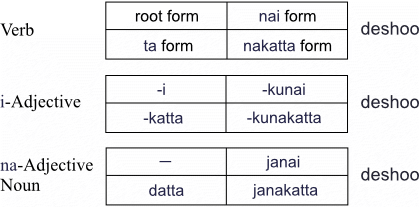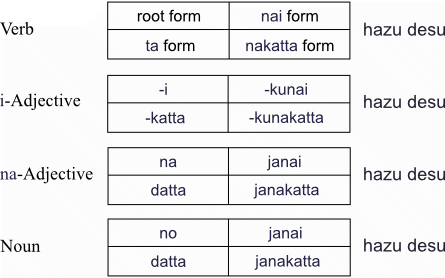Deshoo Conjecture ; "It should be", "It must be"
Deshoo follows the plain form at the end of a sentence to indicate conjecture or supposition.
This pattern shows that the speaker strongly believes what he/she has said is true. It has more definite sound than to omoimasu.
This pattern also expresses speaker's impression with some surprise.

| 1. | Hokkaidoo no fuyu wa samui deshoo. |
| It must be very cold in the winter of Hokkaido. |
| 2. | Kyoo wa heijitsu da kara, eigakan wa suiteiru deshoo. |
| There shouldn't be so many people in the movie theater since today is a weekday. |
| 3. | A | : | Doo shita-n desu ka? |
| B | : | Kaidan de koronda-n desu. |
| A | : | Itakatta deshoo. |
| A | : | What happened? |
| B | : | I fell from the stairs. |
| A | : | It must have hurt. |
Deshoo ka? Indirect question
When deshoo is used in a question, it becomes an indirect question.
This is a polite way to ask someone something he/she is not responsible to know.
| 1. | Smith | : | Kuukoo made donogurai kakaru deshoo ka? |
| Tanaka | : | 30-pun gurai deshoo. |
| Smith | : | Do you know (by any chance) how long it will take to the airport? |
| Tanaka | : | It should take about 30min. |
| 2. | Katoo | : | Sono hoteru ni puuru ga aru deshoo ka? |
| Suzuki | : | Aru deshoo. Ookii hoteru desu kara. |
| Katoo | : | Would that hotel have a swimming pool? |
| Suzuki | : | Probably. It's a big hotel. |
Hazu desu Conjecture ; "be expected", "should do"
Hazu desu follows plain form and expresses a conjecture.
This pattern is used when the speaker tells his/her inference with certain factual information.

| ex. |
Verb |
aru hazu desu |
|
i-Adj. |
oishii hazu desu |
|
na-Adj. |
hima na hazu desu |
|
Noun |
raishuu no hazu desu |
| 1. | A | : | Smith-san wa kyoo kaisha ni iru deshoo ka? |
| B | : | Ee, iru hazu desu. Taisetsu na kaigi ga aru tte itte imashita kara. |
| A | : | Is Smith in the office today? |
| B | : | He should be. He said there is an important conference. |
| 2. | A | : | Tanaka-san wa uchiawase no jikan o shitteiru deshoo ka? |
| B | : | Shitteiru hazu desu. Meeru de renraku shimashita kara. |
| A | : | Does Tanaka know what time we are having the meeting? |
| B | : | He should. I sent him an e-mail about it. |
Itte kimasu "go and come back"
The verb kimasu (come) forms compound verbs with the te form of other verbs.
Itte kimasu literally means "go and come back", katte kimasu literally means "buy and come back".
Chotto is often added in order to imply that it is just a short time.
| 1. | Chotto ginkoo ni itte kimasu. |
| 2. | Chotto obentoo o katte kimasu. |
| I'm going to get a lunch box. |
| Copyright (C) | CosCom Language Service, Inc. | All Rights Reserved. |




